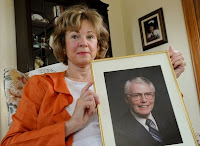Executive Director - Euthanasia Prevention Coalition
 |
| Joy Wawryzniak |
On September 4, the Toronto Star published the article on the Wawrzyniak case.
Link to my comments on this case: http://alexschadenberg.blogspot.com/2010/09/lawsuit-could-set-precedent-about-end.html
Over the past few days there have been a significant number of letters printed in the Toronto Star about this issue. You need to know that the paper picks and chooses the letters it publishes, therefore the letters that were published represent a cross-section of the letters that were received.
Here is a cross-section of the comments that have been published in the Toronto Star:
Dr. Bernard Dickens says, “If the patient’s life cannot be saved in a meaningful way and if intervention would deny resources that would benefit other patients . . . then the doctor is justified in clinical judgment to withhold treatment.”
This seems to be the policy prevailing in Canadian hospitals, making elderly patients fearful of being hospitalized because tests and treatments will be considered in the context of their cost effectiveness and age appropriateness.
Ageism doesn’t appear to matter in the medical field, and a tragic proof was Douglas DeGuerre’s dying plight trying to breathe, with no doctors willing to help him.
I wish Joy Wawrzyniak success in her litigation. It may be too late for her father, but it could help save countless lives.
Jaime Oksemberg, TorontoConsidering the recent case of Joshua Kulendran Mayandy who was denied fluids and nutrition, even though he was not otherwise dying, and the hospital and the lawyers pressured the potential SDM was accepted only because he succumbed to the demand that no IV fluids, nutrition and medicine be provided to Joshua.
“Physicians are not obligated to provide treatment that will almost certainly be of benefit to the patient” (2006 CPSO End of Life Policy).
What is a benefit and who defines it? The ambiguity of this definition allows doctors to use their clinical judgment along with their own value judgment to determine whether a patient is worthy of treatment. Every vulnerable patient is at risk.
Barbara Farlow, Mississauga
My blood boiled as I read this article. In December 2009 my elderly mother was admitted to Sunnybrook Hospital. My mother also had a strong will to live. It was very clear from the start that the attending physician had “written her off” due to her age and co-morbidities and had no interest in optimizing her medical condition.
It was only due to a combination of both physician family members and other persistent family members who screamed and begged for treatment that the attending physician and his team begrudgingly gave it (by then, in an untimely manner).
The experience has haunted our family and left deep, lasting scars. It is frightening that his approach is being taught to residents and medical students on his team who follow him at this renowned teaching hospital.
Decisions about the extent of medical care need to be discussed with the patient and the family, and decisions to not provide active medical treatment cannot be a unilateral physician decision. Otherwise, this bodes extreme danger for the future medical care of our aging population.
Carolyn Telner, Toronto
Your article about Ms Wawrzyniak’s horrifying experience in Sunnybrook conjured up the demons of the past in me. A mere 65 years ago, doctors in my home country decided whose life is not worth living and who should not raise children. Doctors, assisted by nurses and social workers, “euthanized” and sterilized tens of thousands of people they, with their professional expertise, deemed too ill to live, too disabled to raise children or in general too much of a burden for society. ...
...Doctors may make suggestions — even recommendations — but certainly not decisions. This is entirely up to the patient. Or would you like to have your hairdresser decide what haircut is right for you, or let your real estate agent buy a house he finds appropriate for you?
The idea that doctors decide who is worthy of their help and who isn’t would make hospitals a scary place. Better not contradict your doctor or you might regret it later?
And think about the influence of economic circumstances in this equation. Better switch off that senior over there so we can use our resources more economically?
We must fight this at the beginning so this inhumanity can never again get a hold in our societies. If Ms Wawrzyniak needs support for her legal fight, I would gladly donate. And hope these arrogant doctors get a well-deserved slap on their hands.
Tom Wiedemann, Toronto
In 1996 the Ontario legislature passed the Health Care Consent Act, which clearly sets out that the wishes of a person are to be followed by health professionals, and that substitute decision makers are obliged to follow those wishes as well.
The legislation provides a mechanism for physicians to challenge a person’s decision to determine if it is appropriate. The legislation does not envisage physicians making unilateral decisions. The Consent and Capacity Board of Ontario was entrusted with the duty to adjudicate these issues and it has done so for the past 16 years, including many end-of-life issues.
People in this situation should know their rights and physicians should be more aware of the mechanisms in place to deal with these complex and emotional issues.
Theodore Nemetz, Barrister and Solicitor, Former lawyer member and past chair, Consent and Capacity Board
My biggest questions are related to definitions and false legal precedents. Since when was it in the "best interests" of the patient to deny them any medical treatment, including fluids, hydration and or oxygen, when they are not otherwise dying?
Link to the comments: http://www.thestar.com/opinion/letters/article/858858--decisions-about-dying

No comments:
Post a Comment